初二英语上册知识点同步辅导
(外研版)初中英语八年级上册知识点归纳总结
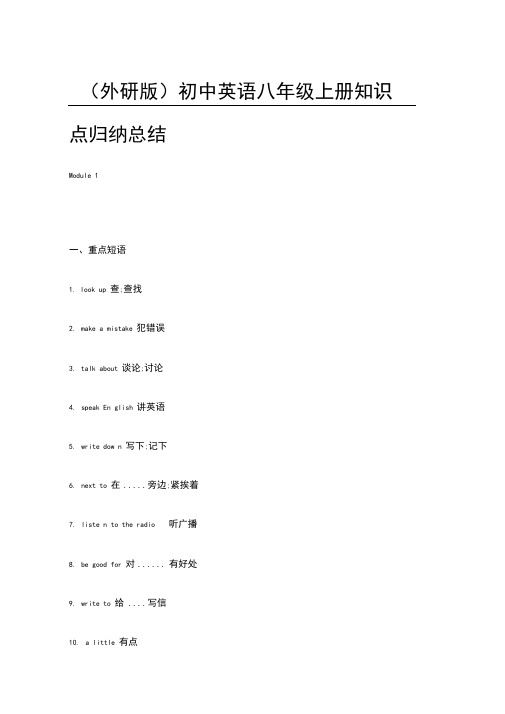
(外研版)初中英语八年级上册知识点归纳总结Module 1一、重点短语1.look up 查;查找2.make a mistake 犯错误3.talk about 谈论;讨论4.speak En glish 讲英语5.write dow n 写下;记下6.next to 在..... 旁边;紧挨着7.liste n to the radio 听广播8.be good for 对...... 有好处9.write to 给 .... 写信10. a little 有点12. talk to 跟……交谈11.agree with sb. 同意某人13.send sth. to sb. 把某物(发)送给某人14.ask for 请求15.watch films 看电影16.be from 来自17.smile at 冲 .... 微笑18.go to bed 去睡觉19.get up 起床20.thi nk about 考虑21.make frie nds with sb. 与某人交朋友22.take sb. around sp. 带领某人参观某地23. a few 几个;一些24.i nvite sb. to 邀请某人到....25.be good at 擅长26.for example 例如、重点句型1.advise sb to do sth 建议某人做某事2.be afraid to... 害怕做.....3.be good for... 对...... 有好处的4.be (a) great way(s) to do sth 做......... 的(一种)好方法5.It is n atural to do sth. 做某事是合乎常情的。
三、重点语法1.Why not...? = Why don ' t + you (we / they...)...?意为“为什么不……呢?”,后接动词原形。
八年级英语同步辅导(上册)

八年级英语(上册)深入教材,提优训练(复习学案)Unit 1.Where did you go on vacation ?一、重点单词(听写)二、重点短语。
(听写)1.相当多,不少2.去度假3.待在家4.照一些照片5.感觉像……;想要6.到达三、重点知识点拨:1、seem 的常用句型。
a.主语+seem(+to be ) +表语。
Tom seems (to be ) a very clever boy.b.It’s seems/ seemed+ that 从句。
It seems that no one knows what has happened in the parkc.主语+seem +动词不定式。
I seem to have caught a cold.2.quite a few 与quite a little二者都表示“相当多,不少”。
quite a few+可数名词quite a little+不可数名词a. There _____ ______ _____ _____ new books in the bookstore.(书店里有相当多的书)b. There _____ ______ _____ ______ water in the bottle.(瓶子里有很多水)3.How do you like…是口语中一个常用句式,意为“你觉得……怎么样?”相当于“What do you think of…”。
注意:How do you like…还可用于下列场合:a.在喝茶或咖啡时,询问对方:“你喜欢喝什么样的茶或咖啡?”。
---How would you like your coffee? ---_____________________.(2012无锡中考)A. Black, pleaseB. Very muchC. It tastes goodD. No, thanksb.用于饭店询问顾客对饭菜的做法。
英语八年级上册重点知识归纳
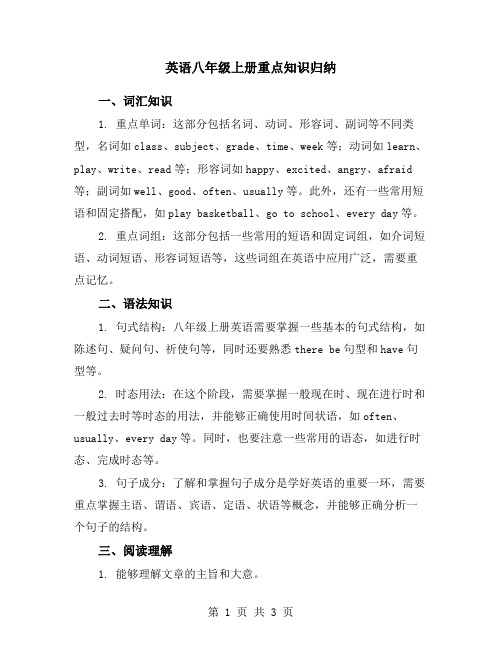
英语八年级上册重点知识归纳一、词汇知识1. 重点单词:这部分包括名词、动词、形容词、副词等不同类型,名词如class、subject、grade、time、week等;动词如learn、play、write、read等;形容词如happy、excited、angry、afraid 等;副词如well、good、often、usually等。
此外,还有一些常用短语和固定搭配,如play basketball、go to school、every day等。
2. 重点词组:这部分包括一些常用的短语和固定词组,如介词短语、动词短语、形容词短语等,这些词组在英语中应用广泛,需要重点记忆。
二、语法知识1. 句式结构:八年级上册英语需要掌握一些基本的句式结构,如陈述句、疑问句、祈使句等,同时还要熟悉there be句型和have句型等。
2. 时态用法:在这个阶段,需要掌握一般现在时、现在进行时和一般过去时等时态的用法,并能够正确使用时间状语,如often、usually、every day等。
同时,也要注意一些常用的语态,如进行时态、完成时态等。
3. 句子成分:了解和掌握句子成分是学好英语的重要一环,需要重点掌握主语、谓语、宾语、定语、状语等概念,并能够正确分析一个句子的结构。
三、阅读理解1. 能够理解文章的主旨和大意。
2. 能够理解文章的细节和事实。
3. 能够根据上下文猜测生词的意思。
4. 能够理解作者的观点和态度。
5. 不断提高阅读速度和理解能力。
四、写作知识1. 写作技巧:掌握一些基本的写作技巧,如正确的语法、拼写和标点符号,以及正确的文章结构等。
2. 写作实践:通过不断的写作练习,提高自己的写作能力。
除此之外,八年级上册英语还需要注意以下几个方面:1. 听力训练:每天坚持进行听力训练,提高听力理解能力。
2. 口语表达:鼓励学生多进行口语练习,提高口语表达能力。
在口语表达中要注意语音、语调和语速等方面的问题,同时也要注意表达的准确性和得体性。
2023人教版八年级上册英语同步解析

2023人教版八年级上册英语同步解析一、导言人教版八年级上册英语是初中阶段学习的重要一环,是学生打好英语基础的关键阶段。
本教材旨在通过系统的英语学习,帮助学生掌握初中英语的基本知识和技能,提高学生的英语综合能力。
为了帮助学生更好地掌握课本知识,本文将对2023年人教版八年级上册英语课本进行同步解析,为学生提供更系统、全面的学习指导,帮助学生更好地掌握英语知识。
二、Unit 1 Where did you go on vacation?本单元主要介绍谈论去过的地方的句型,教学重点是过去式的构成及运用,教学难点是特殊疑问句的运用和回答。
学生在学习本单元时主要应注意以下几点:1. 学习动词过去式的构成及运用,例如go—went,play—played 等;2. 掌握询问过去经历的特殊疑问句构成及回答,例如Where did you go on vacation? I went to the beach.三、Unit 2 What’s the matter?本单元主要介绍询问健康状况的句型,教学重点是学会用What’s the matter? What should I do? 句型询问疾病并给出建议。
学生在学习本单元时主要应注意以下几点:1. 掌握询问健康状况的基本句型,例如What’s the matter? What should I do?2. 学习并掌握常见疾病的表达及相关建议,例如I have a toothache. You should see a dentist.四、Unit 3 Could you please clean your room?本单元主要介绍请求他人做事的礼貌方式,教学重点是能在日常交际中运用请求的礼貌形式。
学生在学习本单元时主要应注意以下几点: 1. 学习礼貌地请求他人做事的句型,例如Could you please clean your room?2. 掌握礼貌回应及表示同意的表达方式,例如Sure, I’d be happy to.五、Unit 4 Don’t eat in class.本单元主要介绍规则和禁令的表达方式,教学重点是口头表达和书面表达中能正确、流利地运用祈使句用以表示规则和禁令。
初二英语同步辅导讲义

初二英语同步辅导讲义Unit 2 What are you going to do ?主要内容:1.词汇fifth, trip, field, trip, fish, fishing, go fishing, east , boating, go boating, maybe, mountain, hike, hiking, go hiking, agree, picnic, the day after tomorrow, top, problem, quick, quickly, start, trip, trip over, tire, hurry, hurry up, tie, die, more, city, take, eighth, salesgirl, far, beautiful2.日常交际用语Let's discuss it.Are we all going?I like go fishing.Let's go boating on the river.That' s going to be fun.I agree.3.语法be going to 句型“ be going to+动词原形”表示将要发生的事,或打算、计划、决定要做某事。
常与表示将来的时间连用。
如:tomorrow, tomorrow morning/afternoon/evening, this evening, next week/month/year 等。
be 是助动词, 随着主语的人称和数的变化而变化。
否定句在be后加not, —般疑问句将be放句首大写。
例如:I am going to have a swim tomorrow. 我打算明天去游泳。
They aren't going go have any lessons next week. 他们下星期不上课。
Is Li Lei going to play basketball after school ? 李雷打算放学后去打蓝球吗?—Where are you going to meet ? 你们打算在哪儿见面?—On the road outside the school gate. 在校门口的马路上。
初二第一学期英语同步辅导
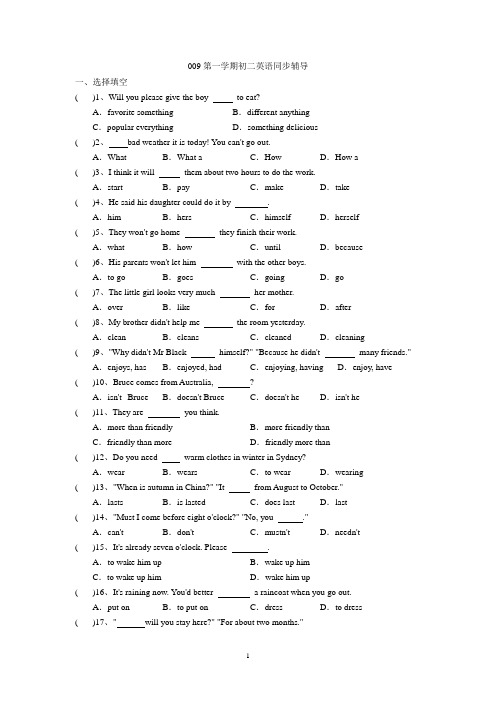
009第一学期初二英语同步辅导一、选择填空( )1、Will you please give the boy to eat?A.favorite something B.different anythingC.popular everything D.something delicious( )2、bad weather it is today! You can't go out.A.What B.What a C.How D.How a( )3、I think it will them about two hours to do the work.A.start B.pay C.make D.take( )4、He said his daughter could do it by .A.him B.hers C.himself D.herself( )5、They won't go home they finish their work.A.what B.how C.until D.because( )6、His parents won't let him with the other boys.A.to go B.goes C.going D.go( )7、The little girl looks very much her mother.A.over B.like C.for D.after( )8、My brother didn't help me the room yesterday.A.clean B.cleans C.cleaned D.cleaning( )9、"Why didn't Mr Black himself?" "Because he didn't many friends."A.enjoys, has B.enjoyed, had C.enjoying, having D.enjoy, have ( )10、Bruce comes from Australia, ?A.isn't Bruce B.doesn't Bruce C.doesn't he D.isn't he( )11、They are you think.A.more than friendly B.more friendly thanC.friendly than more D.friendly more than( )12、Do you need warm clothes in winter in Sydney?A.wear B.wears C.to wear D.wearing( )13、"When is autumn in China?" "It from August to October."A.lasts B.is lasted C.does last D.last( )14、"Must I come before eight o'clock?" "No, you ."A.can't B.don't C.mustn't D.needn't( )15、It's already seven o'clock. Please .A.to wake him up B.wake up himC.to wake up him D.wake him up( )16、It's raining now. You'd better a raincoat when you go out.A.put on B.to put on C.dress D.to dress( )17、" will you stay here?" "For about two months."A.How many B.How much C.How often D.How long( )18、The teacher told us for the meeting.A.not be late B.don't be late C.not to be late D.not late( )19、Will you please me the book when you come to school?A.take B.bring C.carry D.borrow( )20、Class was over. All the students stopped and went out.A.write B.to write C.writing D.wrote( )21、---Ought we to elect a secretary now?----No, you .A. shouldB. ought not toB.C. ought to notD.not ought to( )22、----What are you doing for vacation?----I . time with my family.A. spendB. spendsC. am spendingD.spent( )23、What do you think English class?A. atB. ofC. onD. for( )24、She usually goes to school by bus, but these days she tries a bike.A..to rideB.ridingC.to ridingD.rode( )25、We should be polite to .A.the other B.other C.others D.the others二、根据要求变换句型。
2011-2012语法(无答案)第一学期初二英语同步辅导一U1A

2011-2012第一学期初二英语同步辅导一U1A短语学习:1. take charge of 主管,掌管2. take notes 记录3. vote for 投票赞成4. talk… over 详谈5. be responsible for 负责6. make a list of把……列成清单7. be free for(someone)对...免费8. pay for 付费9. make a decision about 对…作出决定10. in one week’s time 一周后11. a copy of 一份12. for free 免费13. from the air 从空中14. of one’s own 某人自己的重难点:ought to用法详解1. ought to表示义务或责任。
意为“应该”。
如:We ought to leave at once. 我们应该马上离开。
Such things ought not to be allowed. 这类事不该容许。
2. ought to表示建议或劝告。
意为“应该”。
如:You ought to see the new film. 你应该看看这部新电影。
We oughtn’t to take risks. 我们不宜于冒险。
He said I ought to write an article about it. 他说我应当写一篇文章谈这事。
3. ought to表示推断。
意为“应该”、“可能”。
如:That ought to be enough food for all of us. 那些该够我们大家吃的了。
Ask John. He ought to know. 问问约翰吧,他该知道。
I ought to be fit for work next month. 下个月我想必可以工作了。
【注】用ought to 表示推断时,语气较肯定,通常指的是一种合乎逻辑的可能性(与should表推断时相似),有时可译为“准是”(但语气比must要弱)。
第一学期初二英语同步辅导六U3B

第一学期初二英语同步辅导五U3B 知识点精析:3. information, news, messageMobile phones can send short messages.Would you like to leave a message?巩固练习(三)完成句子综合练习一、语言知识与运用。
二、完型填空。
(10分)(三)阅读理解。
ARon is ten years old. He loves to watch TV. But for one full year he did not watch TV at all. What was the reason? Ron’s parents said they would give him $ 600 if he didn’t watch TV for a year.Ron’s parents thought he watched too much TV. One day his mother saw a news- paper story about a boy who didn’t watch TV for a year. She showed the story to Ron. Ron liked the idea. He turned off the TV right away, and said, “It doesn’t bother me not to watch TV. I just want the money.”At first, Ron’s parents were very happy. Ron read books and newspapers, played outside, played computer games, and played cards with his mother. But after some time, he got bored(厌烦). Every morning, he asked his parents, “What are we doing tonight?” Sometimes his mother and father wished he would watch TV just for one evening. Ron alw ays said, “No, it would cost me money!”Finally the year was over. Then Ron stared watching his favourite TV shows all day long again. Ron got the money from his parents. What does he plan to do with the $ 600? “I want to buy myself a TV set!” he said.1. Ron didn’t watch TV for one year because ________.A. he wanted the moneyB. watching TV too much is badC. he wanted to study harderD. he wanted to learn from the boy2. “It doesn’t bother me not to watch TV” means “It’s _______ to watch TV”.A. waste timeB. important for meC. not useD. not important for me3. Ron thought _________ for him to read and play all the time.A. it was great funB. it was no funC. it was enjoyableD. it was good4. Ron’s last words would _______ his parents.A. pleaseB. frightenC. surpriseD. excite5. The best title for the story is _______.A. A Funny StoryB. A Year without TVC. A Good BoyD. Buying a TV SetBJ.K. Rowling is the writer of Harry Potter, which is now one of the bestsellers in the world.J.K. Rowling was born in Bristol on July 31st, 1965. She has one sister who is two yearsyounger than her. Both girls loved listening to their father reading bedtime stories to them. They especially loved stories about magical worlds. Rowling wrote her first story, called Rabbit, at the age of six.After she graduated from the university, Rowling worked as a translator(翻译者)in London. During this time, on a long train trip in the summer of 1990, the idea came to her of a boy who has magic but doesn’t know it. In 1992 Rowling began to teach English. S he lived with her baby daughter, Jessica, and spent much time finishing the first Harry Potter book for young readers. It appeared in June 1997. To her surprise, the book was greatly successful. The film came out in November 2001. Now Harry Potter series(系列) is popular with people of all ages and about 60 million books were sold in 200 countries.Why has the series been so successful? There are a few things. Many other magical stories take place in faraway lands or in past or future times. But Harry lives in modern(现代的) England. He’s also a very normal(平常的) boy: polite, friendly, brave and clever. So when other children read about Harry, they can imagine being like him.J.K. Rowling is very happy with the success, and she is now busy finishing the whole seri es of seven books. She’s writing full time and she’s really enjoying life. She says she will go on living a normal life with her daughter and writing children’s books.A. J.K. Rowling met a boy named Harry on a long train tripB. J.K. Rowling loved listening to stories when she was very youngC. J.K. Rowling is two years younger than her sisterA. July 1965B. the summer of 1990C. June 1997A. written for young peopleB. only enjoyed by childrenC. only sold in England4. J.K. Rowling has been successful, and she _5. How is Harry Potter series different from other magical stories?B. The stories happened in the modern world.C. It has seven books.D. It took much time to finish.(四)写作。
八年级上册英语知识点归纳1-2单元
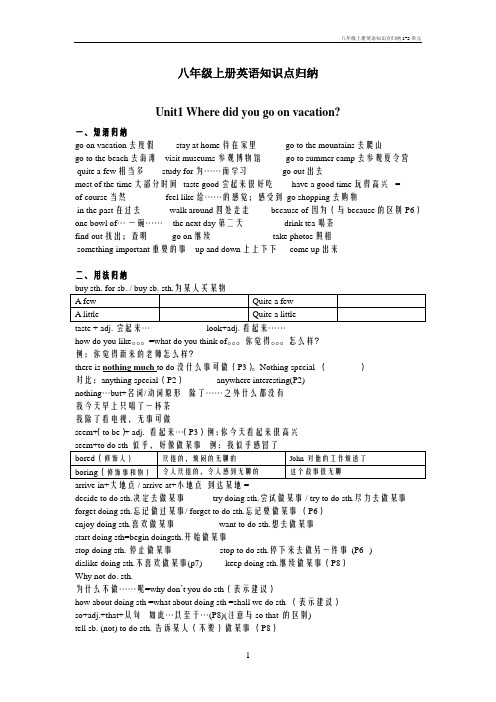
八年级上册英语知识点归纳Unit1 Where did you go on vacation?一、短语归纳go on vacation去度假stay at home待在家里 go to the mountains去爬山go to the beach去海滩 visit museums 参观博物馆go to summer camp去参观夏令营quite a few相当多 study for为……而学习go out出去most of the time大部分时间taste good尝起来很好吃have a good time玩得高兴 =of course当然 feel like给……的感觉;感受到go shopping去购物in the past在过去walk around四处走走because of因为(与 because的区别P6)one bowl of…一碗…… the next day第二天drink tea喝茶find out找出;查明 go on继续 take photos照相something important重要的事 up and down上上下下come up出来二、用法归纳taste + adj. 尝起来…look+adj. 看起来……how do you like。
=what do you think of。
你觉得。
怎么样?例:你觉得新来的老师怎么样?there is nothing much to do没什么事可做(P3)。
Nothing special ()对比:anything special(P2)anywhere interesting(P2)nothing…but+名词/动词原形除了……之外什么都没有我今天早上只喝了一杯茶____________________________________________________我除了看电视,无事可做_____________________________________________seem+(to be)+ adj. 看起来…(P3)例:你今天看起来很高兴____________________________arrive in+大地点 / arrive at+小地点到达某地 =decide to do sth.决定去做某事try doing sth.尝试做某事 / try to do sth.尽力去做某事forget doing sth.忘记做过某事/ forget to do sth.忘记要做某事(P6)enjoy doing sth.喜欢做某事want to do sth.想去做某事start doing sth=begin doingsth.开始做某事stop doing sth. 停止做某事stop to do sth.停下来去做另一件事(P6 )dislike doing sth.不喜欢做某事(p7) keep doing sth.继续做某事(P8)Why not do. sth.为什么不做……呢=why don’t you do sth(表示建议)how about doing sth =what about doing sth =shall we do sth (表示建议)so+adj.+that+从句如此…以至于…(P8)(注意与so that 的区别)tell sb. (not) to do sth. 告诉某人(不要)做某事(P8)too many/ too much/ much too 三者的区别below/above()bring/take()P5三、语法归纳1)用于肯定句的是:用于否定句和疑问句的是:2)不定代词呗形容词和不定式修饰是,修饰词应该置于不定代词之_____,即_________ 我有重要的事情要告诉你:I have我的自行车有毛病:There is with my bike.3)不定代词做主语谓语动词用___________有人在等你:4)表示请求,询问,希望得到比人肯定的回答。
初中英语人教版八年级上册重点知识整理(1~3单元)

八年级英语上册重点知识整理Unit1 Where did you go on vacation?【重点语法】不定代词:不指名代替任何特定名词或形容词的代词叫做不定代词。
用法注意:1、some 和any+可数名/不可数名。
some 多用于肯定句,any多用于否定句、疑问句和条件从句。
有些问句中用some,不用any, 问话者希望得到对方肯定回答。
2、由some, any, no,every 与 body, one, thing构成的复合不定代词作主语时,其谓语动词用三单。
3、不定代词若有定语修饰,该定语要置于其后:如:something interesting【重点短语】1.buy sth for ab./ buy sb.sth 为某人买某物2.taste + adj.尝起来……3.nothing...but + V.(原形) 除了……之外什么都没有4.seem + (to be) + adj 看起来5.arrive in + 大地方 / arrive at + 小地方到达某地6.decide to do sth.决定做某事7.try doing sth.尝试做某事 / try to do sth.尽力做某事8.enjoy doing sth.喜欢做某事9.want to do sth.想去做某事10.start doing sth.开始做某事/ begin doing sth.11.stop doing sth.停止做某事区分:stop to do sth.停下来去做某事12.dislike doing sth.不喜欢做某事14.so + adj + that + 从句如此……以至于……16.tell sb.(not) to do sth.告诉某人(不要)做某事17.keep doing sth. 继续做某事18.forget to do sth.忘记去做某事 / forget doing sth 忘记做过某事【词语辨析】1.take a photo/ take photos 拍照2.seem + 形容词看起来…seem + to do sth.似乎/好像做某事It seems + 从句似乎..….It seems that no>seem like ...好像,似乎…3.arrive in +大地点= get to= reach+地点名“到达......”arrive at +小地点(注:若后跟地点副词here/there/home, 介词需省略,如:arrive here; get home)4.feel like sth 感觉像…feel doing sth.想要做某事5.wonder(想知道)+疑问词(who, what, why)引导的从句。
8年级上册英语同步解析

8年级上册英语同步解析一、单词部分。
1. 重点单词讲解。
- Unit 1 Where did you go on vacation?- anyone:不定代词,意为“任何人”,常用于否定句和疑问句中。
例如:Did you meet anyone interesting on your vacation?(你在假期遇到有趣的人了吗?)其同义词为anybody。
- something:不定代词,意为“某事;某物”,常用于肯定句中。
当用于疑问句时,表示希望得到对方肯定的答复。
例如:I have something to tell you.(我有事情要告诉你。
)There is something wrong with my bike.(我的自行车出毛病了。
)- Unit 2 How often do you exercise?- full:形容词,意为“忙的;满的;充满的”。
be full of = be filled with,例如:The glass is full of water.(玻璃杯里装满了水。
)其反义词为empty。
- maybe:副词,意为“大概;或许;可能”,通常放在句首。
例如:Maybe he is at home.(也许他在家。
)注意与may be的区别,may be是“情态动词+be动词”结构,在句中作谓语。
例如:He may be at home.(他可能在家。
)2. 单词记忆方法。
- 利用词根词缀记忆。
例如,在“unhealthy”这个单词中,“un -”是一个否定前缀,表示“不”,“healthy”是“健康的”,所以“unhealthy”就是“不健康的”。
- 制作单词卡片,一面写单词,一面写释义和例句。
每天复习一定数量的单词卡片,加强记忆。
- 通过阅读英语文章来记忆单词。
在文章的语境中理解单词的用法,这样记忆会更加深刻。
二、语法部分。
1. 一般过去时(Unit 1)- 一般过去时表示过去某个时间发生的动作或存在的状态。
(完整word版)八年级上册英语外研版(新)各模块知识点归纳总结(全)文档,文档
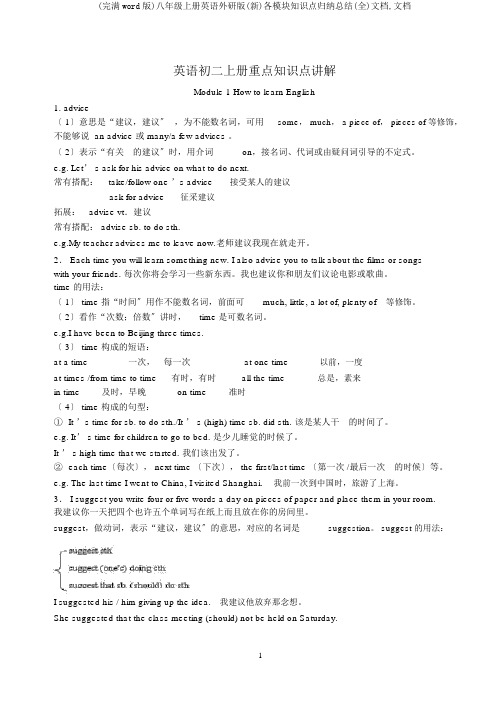
英语初二上册重点知识点讲解Module 1 How to learn English1. advice〔 1〕意思是“建议,建议〞,为不能数名词,可用some, much, a piece of, pieces of 等修饰,不能够说 an advice 或 many/a few advices 。
〔 2〕表示“有关的建议〞时,用介词on,接名词、代词或由疑问词引导的不定式。
e.g. Let’ s ask for his advice on what to do next.常有搭配:take/follow one ’s advice接受某人的建议ask for advice征采建议拓展:advise vt.建议常有搭配: advise sb. to do sth.e.g.My teacher advises me to leave now.老师建议我现在就走开。
2. Each time you will learn something new. I also advise you to talk about the films or songswith your friends. 每次你将会学习一些新东西。
我也建议你和朋友们议论电影或歌曲。
time 的用法:〔 1〕 time 指“时间〞用作不能数名词,前面可much, little, a lot of, plenty of等修饰。
〔 2〕看作“次数;倍数〞讲时,time 是可数名词。
e.g.I have been to Beijing three times.〔 3〕 time 构成的短语:at a time一次,每一次at one time以前,一度at times /from time to time有时,有时all the time总是,素来in time及时,早晚on time准时〔 4〕 time 构成的句型:①It ’s time for sb. to do sth./It ’ s (high) time sb. did sth. 该是某人干的时间了。
2024年八年级上册英语知识点总结

start(同义词)begin
far(反义词)near
smoke(现在分词)smoking
careless(反义词)careful
important(比较级) more important
enjoy(现在分词)enjoying
9.invent(名词)invention; inventor
16. although = though虽然
17. most of the students=moststudents
18. shop=go shopping=do some shopping购物
19. as for至于
20. activity survey活动调查
21. do homework做家庭作业
as for...意思是“至于;关于”,常用于句首作状语,其后跟名词、代词或动词的`-ing形式(即动名词)。如:Asfor him,I never want to see him here.至于他,我永远不希望在这里见到。
As for the story,youd better not believe it.关于那故事,你最好不要相信。
30. come home from school放学回家
31. of course = certainly = sure当然
32. get good grades取得好成绩
33. someadvice
34. hardly=not nearly / almost not几乎不
35. keep/be in good health保持健康
Reading in bed is badfor your eyes.在床上读书对你的眼睛有害。
人教版八年级英语上册知识点汇总与练习
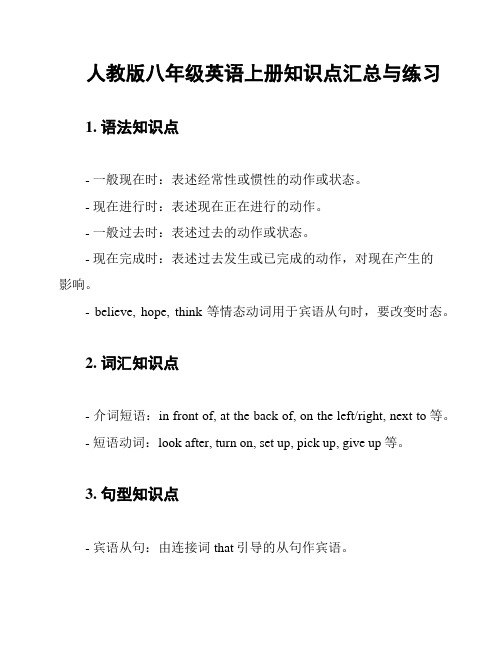
人教版八年级英语上册知识点汇总与练习1. 语法知识点- 一般现在时:表述经常性或惯性的动作或状态。
- 现在进行时:表述现在正在进行的动作。
- 一般过去时:表述过去的动作或状态。
- 现在完成时:表述过去发生或已完成的动作,对现在产生的影响。
- believe, hope, think等情态动词用于宾语从句时,要改变时态。
2. 词汇知识点- 介词短语:in front of, at the back of, on the left/right, next to等。
- 短语动词:look after, turn on, set up, pick up, give up等。
3. 句型知识点- 宾语从句:由连接词that引导的从句作宾语。
- 时间状语从句:由连接词when, before, after, while等引导的从句,用来表示时间关系。
- 目的状语从句:由连接词so that引导的从句,用来表示目的。
- 虚拟条件句:由连接词if引导的条件句,表示假设情况。
4. 阅读与写作练阅读材料:The Importance of ReadingHere are some tips to develop good reading habits:1. Set aside dedicated time for reading every day.2. Choose a variety of books based on your interests.3. Start with books that are at your reading level, and gradually challenge yourself.4. Take notes while reading to help with understanding and retention.5. Discuss the books you read with others to gain different perspectives.写作练:Write about your favorite book and explain why you like it.My favorite book is "Harry Potter and the Philosopher's Stone" by J.K. Rowling. I like this book because it takes me on a magical journey filled with adventure and excitement. The characters are well-developed and the story is captivating. I enjoy the creativity and imagination that Rowling brings to the world of Hogwarts. The book teaches important lessons about friendship, bravery, and the power of love. Overall, "Harry Potter and the Philosopher's Stone" is a book that brings joy and wonder to my life.5. 总结本文档汇总了人教版八年级英语上册的一些重要知识点,包括语法、词汇和句型。
外研版八年级英语上册同步指导及练习(Module1--Module)

外研版⼋年级英语上册同步指导及练习(Module1--Module)Module 1 Learning Methods⼀. 教学重、难点:1. 熟练了解与运⽤本模块的词汇;2. 学习了解⼀些学习英语的⽅法,帮助学⽣养成良好的英语学习习惯;3. 了解记忆类型,并学会科学的记忆⽅法。
⼆. 词和短语:(⼀)本模块是围绕学习英语的⽅法展开的,现将有关与此的短语或句⼦总结如下:Learning methods 学习⽅法(How to improve your English)如何提⾼你的英语。
1. watch TV programmes on CCTV 9.看中央9上的电视节⽬。
2. read English newspapers and magazines.看英语报纸和杂志。
3. watch English films on DVDs or videos通过DVD 或录像看英语电影。
4. talk to foreigners与外国⼈交谈。
5. talk to each other in English⽤英语彼此交谈。
6. listen to English radio programmes =listen to English pogrammes on the radio收听英语⼴播节⽬。
7. learn English on the Internet / the computer在互联⽹电脑上/学习英语。
8. sing English songs唱英语歌9. write notes from the textbook从课本中写⼀些笔记(⼆)其他短语:1. a good way to improve your English提⾼英语的好⽅法2. excellent idea好主意3. at the weekend4. afford to have them买得起它们5. save up money攒钱6. play some sports做⼀些运动7. do some grammar exercises做⼀些语法练习8. the correct way to study English学习英语的正确⽅法.9. get good results得到好分数10. to do this为了做到这个11. several types of memory⼏种记忆的类型12. in our brain在我们的⼤脑中13. short- term memory短期记忆14. long – term memory长期记忆15. write it down把它记下来16. the next day第⼆天We’ll correct it and send it back to you the next day.17. in this case在这种情况下18. be useful for getting good results对得到好分数是有作⽤的19. repeat the information重复这个信息20. several times21. after several weeks⼏周后22. send an email through the Internet通过互联⽹发送⼀封电⼦邮件三. 重点句式的讲解与分析.1. It’s good to talk to foreigners.与外国⼈交谈是有好处的。
英语八年级上册教材同步详细讲解
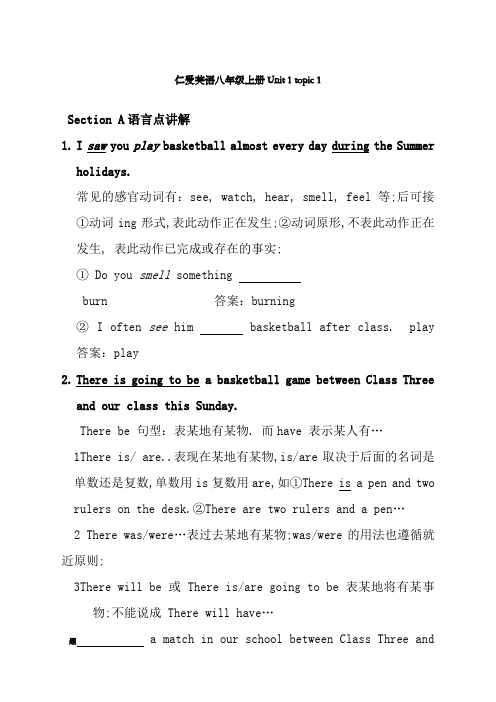
仁爱英语八年级上册Unit 1 topic 1Section A语言点讲解1.I saw you play basketball almost every day during the Summerholidays.常见的感官动词有:see, watch, hear, smell, feel 等;后可接①动词ing形式,表此动作正在发生;②动词原形,不表此动作正在发生, 表此动作已完成或存在的事实;① Do you smell somethingburn 答案:burning② I often see him basketball after class. play答案:play2.There is going to be a basketball game between Class Threeand our class this Sunday.There be 句型:表某地有某物. 而have 表示某人有…1There is/ are..表现在某地有某物,is/are取决于后面的名词是单数还是复数,单数用is复数用are,如①There is a pen and tworulers on the desk.②There are two rulers and a pen…2 There was/were…表过去某地有某物;was/were的用法也遵循就近原则;3There will be 或 There is/are going to be 表某地将有某事物;不能说成 There will have…题 a match in our school between Class Three andClass Four next week.3.Would you like to come and cheer us on4.----- Sure, I’d love to.1Would you like + 不定式表建议或邀请;常用I’d love to 来回答,不同意也常用“I’d love to, but…”来拒绝别人;如:Would you like to play basketball with me --- I’d love to, but I have a lot of homework to do.2在肯定句中 would like= want 如:I’d like to have a rest.= I want to have a rest.5.I hope our team will Me , too.= So do I.① hope + that从句,that 可省去;I hope that I can see you soon.② hope to do sth. I hope to see you soon.注意: 1wish愿与hope的用法一样,后既可以接从句也可以接不定式,但不能说hope sb. to do sth. hope 后不接双宾语, 但 wish 可以,如:I hope you to help me 错 I hope that you can help me.对2hope 后接的从句常用将来时态表可以实现的愿望,而wish 后接的宾语从句常用过去时态表难以实现的愿望,如:①I hope you will come. ②I wish I could fly to the moon.5. I prefer rowing.1prefer过去式\过去分词需双写 preferred 后可直接接动词ing 形式或动词不定式, 表更喜欢…, 用法同like/ love:①I prefer swimming 更喜欢经常游泳②I prefer to swim.更喜欢这一次去游泳2prefer doing A to doing B 相当于:like… better than…I prefer swimming to skating. ==I like swimming better than skating.3 后接不定式时与rather than 或instead of连用,如:Hepreferred to die rather than to steal. / He preferredto die instead of stealing. 他宁死也不去偷窃;6. -----Do you row much 你经常划船吗----- Yes , quite a bit /a lot. 是的,经常;quite a bit/ a lot 经常/许多,大量. ①quite a bit of 后接不可数名词,如:quite a bit of money; ②quite a lot of 后既可接可数名词复数也可以接不可数名词,如:quite a lot of books/ information;而③quite a few=many 表“相当多”后接可数名词复数,如:quite a few students④quite a little =much表许多,后接不可数名词,如; quite a little money ⑤very few / little 很少很少;7.Are you going to join the school rowing club8.①join 加入人群,组织②take part in 参加活动,比赛注意:1join可与in连用,后接活动,即 take part in=join in =be in后都接活动;如:①He joined in the game ;②He joined in helping the old man. ③I’ll be in the relay race. 2 Join sb.in doing sth. 表加入某人的活动; 如:Will you join us in playing basketballSection B1.How tall is he, do you know----- Yes. He is meters tall.与how构成的疑问词有:How tall身高多高; how high山多高;how heavy多重;how long 多长;How wide 多宽;how deep 多深;how old 多大…. 对应的回答常用“数词+量词+形容词”,如:meters tall; 2 kilometers high; 3 kilos heavy; 20 years old 2.They both play for the Houston Rockets in the NBA.play for 为某个队效力;play against 与某个队比赛;play with 玩某物/与某人玩比较:play basketball 打篮球;Look, the baby is playing with a basketball 玩弄一个篮球3. what are you going to be when you grow up = what do you wantto be …你长大想干什么6.David Beckham, a famous soccer star, arrived in Beijing withhis team yesterday.表到达的有:①arrive at + 小地名;arrive in +大地名② get to③ reach7.The fans are very excited.1excited 表“感到激动的、兴奋的”,常只作表语,主语常为人;如:We are excited.类似的有:interested有趣的; tired感到疲劳的; bored 感到厌烦的2exciting 表“令人激动兴奋的”既可作定语,也可作表语;作表语时,主语常为事物,如:①an interesting book; ②Thebook is interesting.类似的有:interesting令人有趣的; tiring令人感到疲劳的; boring令人感到厌烦的8.It’s too bad that they aren’t going to stay in Beijing forlong.主语是斜体that从句部分,前用it 来代替它;因此这是一个含主语从句的复合句;It’s too bad that…= It’s a pity that…= It’s a shame that..很遗憾…..9.在英语中有一些表示位置移动的词,如:go,come,leave, arrive,fly 可用现在进行时态表将来;如:They are flying to Wuhan tomorrow. 表将飞往武汉而不是正去武汉 They are leaving for Japan.= They will leave for Japan.10.Zhang Yining, one of the world’s best women table tennisplayers, won two gold medals for China.1one of 表…中的一个,后接可数名词的复数,如:one of my friends2名词作定语修饰名词时,一般用单数形式,如:two book shops, two shoe shops, 但man,woman,sports修饰可数名词复数时,常用复数形式,如:two men teachers; sports meet3win a gold medal赢得一枚金牌; win a prize 赢得奖品; win the first place 赢得第一名10. What a shame = What a pity 多么遗憾类似的有:What fun 多么有趣11. break the record 打破纪录;keep the record 保持纪录12. Please write back soon.write back 回信Section C1.once a week, 一周一次twice a week一周两次, 三次或三次以上用“数字+times”如:three times a year, four times a day, five times a week,…..2.go + v-ing形式的短语表“去做某事”如:go hiking 去徒步旅行,go shopping去购物, go skating 去滑冰,go skiing 去滑雪;go fishing 去钓鱼;3.she spends half an hour doing exercise in the gym every day.当exercise指“体操、练习”时,是可数名词,如:do morning exercises 做早操;do English exercises 做英语练习题;但exercise指“锻炼,运动”时,是不可数名词;如:do exercise 做运动;exercise 还可作动词,指“锻炼,运动”如:She exercises every morning.4.She plays it pretty well.pretty well= very well相当好5.She is also good at jumping.be good at…= do well in…擅长…如:I am good at English.= I do well in English.be good for… 对…有好处,Running is good for your health.反义词为:be bad at= do badly in 不擅长…. be bad for 对…有害类似短语:be good/bad to sb. 对某人好/不好6.They are sure that she will win.①be sure +that从句,表“确信…”如:I’m sure that eatingtoo much is bad for you.②be sure to do sth..确信做某事We are sure to win next time.③be sure of/about doingsth. 表确信做某事 I’m sure ofthat.7.How often does she go cycling(1)go +动词ing形式,表进行某种户外活动,如:go swimming,go fishing, go climbing.(2)How often问多久一次,频率;常用sometimes, seldom,twice a year等回答;How long 问多久;常用“For一段时间”来回答How soon 问多快时间,用于将来时态;常用“In an hour 在一小时内等”来回答;如:How soon will you come back-----In a week.与how搭配的疑问词有:①How many 多少接可数名词复数形式②How much 多少接不可数名词③How old 问年龄④How tall 多高人、树⑤How high 多高山、楼⑥How far 问距离⑦ How long 还可以问物体的长度1 is it from your home to your school------It’s two kilometers away.2 is the room------ It’s two meters wide.3 is the tree-------It’s three meters high.8. Because it makes me strong and it is popular all over the world.因为它使我强壮并且它流行make, let , have 当表“使,让”时是使令动词,后接动词原形;如:make me crymake 后还可以接形容词,名词,如: make me strong, make him our monitor ,11.keep healthy = keep fit 保持健康healthy=fit都是形容词,health 是名词Section D1.Have a good day 祝你今天玩得高兴 Have a good journey 旅途愉快 Have a good time 祝你过得愉快 Have a good weekend 周末愉快八年级上册Unit 1 topic 2Section A1.Michael, could you please do me a favor2.(1)Could you please = Would you please…意为“请你…好吗”后接动词原形(2)do sb. a favor= help sb.= give sb. a hand 帮某人的忙;3.But one of my teammates fell ill;但是我们队友中的一员病了;1One of +可数名词复数,表“….. 中之一”当它作主语时,是单数第三人称;如:One of my friends likes playing computer games 类似的短语有:Some of …;中的一些 most of…中的大多数;2 fall ill 生病强调动作be ill 病了强调状态如:He fell ill yesterday, and now he is ill in bed.4.----Would you mind teaching me ----- Not at all. 你介意教教我吗---- 不介意;5.(1)Would you mind notdoing sth. 你介意别做某事吗礼貌地请求某人做或别做某事回答去做的有:Not at all 或 Of course not或Certainly not 回答不去做的有:Sorry,I won’t ./Yes, please don’t./ You’d better not.(2)Would you mind my/me smoking here常用物主代词 my, her,his, our 等,少用代词宾格me, he, us 等6.Let’s go and practice. 让我们去练习practice+名词/动词ing,表练习什么/做什么,如:①We often practice spoken English.英语口语②Let’s practice dancing.5. Sorry, I’ll put it somewhere else.somewhere else 别的某个地方 somewhere 是不定副词,else 是形容词;形容词修饰不定副词、不定代词时,常放在其后; 如:something sweet甜食;Anything else 还有别的吗Nothing serious 不严重6. Don’t be late next time. --- Sorry, I won’t.对不起,我将再也不会了①be late 迟到,如:You are late again. ②be late for…做…迟到如:He was late for school.3 回答否定祈使句常用:Sorry,I won’t. 如:Don’t shout at me ---- Sorry, I won’t.回答肯定祈使句常用:OK,I will. 如:Please study hard. ---- OK, I will.7.Would you please say it in English. 你能用英语说一下它吗①Would you please not do sth 请求某人做某事②Would you like to do sth. 提建议③Would you mind not doing sth 请求8.That’s very kind of you, but I can manage it myself.太感谢你了,但我会自己处理的;manage 作“管理,处理”时,结构为:manage sb./sth. 如:She managed the hotel well.manage 作“设法做成某事”时,结构为:manage to do sth. 如:it’s too noisy here, I’ll manage to leave here. 注意比较try to do sth. 努力去做某事"It is+形容词+of do sth.."和"It is+形容词+for do sth.."这两个句型容易混淆;什么情况下用of 或for 是一个考点;实际上前者的形容词用来描述某人的,因此可以转换成: Sb.+be+形容词+to do sth. 后者的形容词用来描述做某事的,可以转换成:To do +形容词;如:It is right of you to do more reading.= You are right to do more reading. right 用来描述youIt is easy for you to finish the work. = To finish the work is easy for you.Section B1.You are always so carelessalways 除了用于一般现在时态中,也可用于进行时态中,be always doing sth. 总是…. 常用来赞扬某人,如:She is always helping others.2.You missed a good chance.错过一个好机会miss意为”思念,错过”如:①I miss my mother very much. ②She missed the early bus.3.He did his best .他尽力了;a)do one’s best=try one’s best 尽某人最大努力②Doone’s best to do sth.=try one’s bestto do sth. 某人尽力去干某事 We will do/try our best to study English well.4.Kangkang, would you mind saying sorry to Michael 你介意向Michael 道歉吗5.①Say sorry to sb 向某人道歉②say hello to sb. 向某人打招呼/问候;③say goodbye to sb. 向某人道别;6.I am sorry for what I said. 我为我所说的道歉;for 后面的what I said我所说的是一个宾语从句;类似的还有:what I saw 我所见的,what I thought about我所考虑的a)Be sorry for 表为…. 道歉,后面接名词、代词、从句或动名词;②Be sorry to do sth.抱歉去做某事; 有时①②可互换如:I’m sorry for troubling you.= I’m sorry to trouble you.7.Keep trying We are sure to win next time.1Keep doing sth. 坚持做某事;keep sb. doing sth. 让某人一直干某事;keep on doing sth. = go on doing sth. 继续做某事2 ①be sure to do sth. 确信要做某事表将来如:It’s sure torain. 肯定要下雨;②be sure +that从句, 如: We are sure that we will winnext time.③be sure about sth. 对某事确信,如:I’m sure about theanswer.7. Kangkang was angry with Micheal.be angry with sb. 生某人的气be angry at sth. 因某事而生气, 如:He was angry at what he had said.8. With the help of Maria and Jane, Kangkang said sorry to Micheal.With the help of sb. = with one’s help 在某人的帮助下 With Maria and Jane’s help,….9. 1 turn on 打开电器、龙头等; turn off 关; 2 turn up 调大音量 turn down 调小音量10. please take a seat. 请坐Take one’s seat = have one’s seat 坐某人的座位如:He took his seat and read a book.12.be busy with sth. 为某事而忙碌;如:Kangkang is busy withhis exam.be busy doing sth. 忙于做某事如:He is busy preparing forChristamas.12. Never mind.= It doesn’t matter.= That’s OK/all right.=Not at all. 没关系;都可以用来回答“I’m sorry.”如:I’m sorryI didn’t call you last night. --- Never mind. I guess youwere busy.Section C1.Exciting Yes, but very tiring as well. 很精彩是的,但也很累;表“也”的有下列词,用法如下:①as well / too 用于肯定句末. I’m a student. He is a studentas well/too.②also 用于肯定句中位于系动词、情态动词之后,行为动词之前如:He is also a student. He also likes English.③either 用于否定句末;I’m not a student, he isn’t astudent either.2.He invented an indoor game for his students so that they couldplay even in bad weather.1 so that ①为了,以便 He got up early so that he could catchthe early bus.②结果,以致 He left his book at home so that he wentback home again.so+形容词/副词+that从句:如此….以致…She is sobeautiful that everyone likes him.such+名词短语+that 从句:如此….以致… She is such abeautiful girlthat everyonelikes him.2① invent 动词发明②inventor 名词发明家③invention 名词发明Inventors have invented many great inventions 发明家已经发明了许多伟大的发明;3.Do you know how to score in the game在比赛中得分4.score 进球,得分①名词:The final score is 2-1. 最后得分为2比1;②动词: No one scored in the first half.没人得分在上半场;Section D1.I am a 15-year-old boy. 我是一个15岁大的男孩;用连接号“—”构成的词常做一个形容词,放在名词前作定语,此结构中数词后的词不用复数,不能说成 15-year s-old, 但不是一个词时,year 要用复数;如:He is 15 years old.2.①instead of代替...,是一个副词短语,不能放主语后独立作谓语动词,只能放在动词后作谓语,它后可接名词/代词/动名词v-ing;如:You should play out instead of working indoors.a)instead 代替…放句尾或句首;I don’t like swimming,let’s go hiking instead.3. I have great fun running.fun 是不可数名词,意为“乐趣”,词组have fun doing sth. 在做某事中得到乐趣, 如:We have great fun learning English. 注意:have fun= enjoy oneself= ha a good time.4.Before 和 after 既可作介词,后接动词ing形式;也可作连词,后接时间状语从句;如:开始跳高前,我们必须弄清楚如何跳得高;①Before starting jumping, we must get to know how to jump high. 介词② Before we start jumping, we must get to know how to jump high. 连词5. 短语:①shout at sb 朝某人吼不礼貌地;shout to sb. 朝某人大声地喊②be import to sb./ sth. 对某人是重要的;如:English is important to us.③build sb/oneself up增强某人体质如:Running can build ourselves up.④立刻,马上:in a minute= right now= right away= at once =soon八年级上册Unit 1 topic 3Section A1.I’ll be in the long jump and the high jump.be in + 活动,表“参加某活动, 相当于take part in 和 join in2.maybe 和may be①maybe =perhaps副词,表“可能,也许,大概”,在句中作状语,通常放句首,也可以放动词之前;如:Maybe you are right.可能你是对的②may be 表“可能是”常放句中,如:You may be right.你可能是对的3.动词放句首的几种情况:①动词原形放句首,用于祈使句;如:Read the dialogue loudly ,please.②动词ing形式动名词放句首作主语,把它当作单数第三人称对待;如:Reading in the sun is bad for your eyes.③动词不定式也可以放句首作主语,如: To talk with him is agreat pleasure. 当然,通常我们把不定式放句后,前用形式主语it 来代替它;因此这句话常说成:It is a great pleasure to talk with him.跟他交谈是一种莫大的乐趣4.My foreign friend, Steve, will come to cheer me on.cheer sb on 为某人加油;5.I am sure I will make friends during the sports meet.1 make friends 交朋友2 make friends with sb. 和某人交朋友,如:I wan to make friends with you. 3 sports meet 运动会6. I will do my best. I won’t lose.lose ①输反义词为:winI am afraid I will lose the game. ②丢失 I lost my book.7. It’s my first time to take part in the high jump.It’s one’s first time to do sth. 是某人第一次做…如:It’s her first time to cook dinner/Section B1.Let’s go to plant trees then. 那么让我们去植树吧;plant 和 grow 都表“种植”,一般可互换,但grow 比 plant 更需要精心的培育;常说:plant trees, grow rice.2.Let’s make it half past six. 我们约定6:30吧;这是约定时间的常用表达法.3.enough 的用法:1enough足够的/地修饰形容词或副词必须放在它的后面;如:big enough 大的足够 slowly enough 慢地足够 enough 修饰名词时,即可放其前,也可放其后;如:enough money 或 money enough.2 enough to do sth. 足够…..可以做…. 此句式还可以与so…..that…. ;too…to….互换;She isn’t old enough to go to school.== She is so young that she can’t go to school.=She is tooyoung to go to school.她太小了而不能上学;4.take photos= take pictures 照相Section C1. We’re sorry that we did badly in the high jump, but we’re sure we can do better next time.do badly in = be bad in 在…方面做得差 badly是副词,修饰动词do; bad 是形容词do better in = be better in 做得更好, 更擅长于…. better 是 well,good的比较级2. The People’s Republic of China took part in the Olympics for the first time in 1952.for the first time第一次如:I went to Beijing for the first time last summer holiday.3. The Olympic Games take place every four years.短语:1 take place 发生,举办 2 every four years 每4年一次Section D1. The Olympic rings are a symbol of the Olympic Games.a symbol of …的一种象征 Yellow was a symbol of imperial power in ancient China.2. There are five rings, and they stand for the five parts of the world.stand for 代表… The dragon stands for the Chinese nation.3. You can easily find at least one of these colors in the flag of every country.at least 至少 = over = more than 如:There are at least 400students in our school.4. improve our environment 改善我们的环境1 improve 改善,提高 I don’t know how to improve my English.2 improve oneself自我提高 we should study hard to improve ourselves八年级上册Unit 2 topic 1Section A1. What’s wrong with you 你怎么了同义句有:What’s the matter/ trouble with youmatter/ trouble 是名词,前用the ; wrong 是形容词,前不用the2. 短语:have a cold=catch a cold患感冒;have a cough 患咳嗽;have a fever 发烧;have a stomachache 胃疼;have a headache 头痛 have a sore throat 喉咙疼注意这两个特殊点的I have a headache. = I have an ache in my head. ache指持续的疼痛,pain 指肉体上的剧烈疼痛,sore常指发炎而引起的肌肉痛3. take a rest = have a rest 休息一下4. lift① 举起lift the box ②消散 The clouds will lift soon③电梯 get out of the lift5. You look pale.系动词有:be是;look看起来, smell闻起来, sound听起来, taste 尝起来, feel觉得,turn/get/become 变;他们后常接形容词作表语, 系动词常可用动词be 来退换;如:The music sounds wonderful. = The music is wonderful.6. I will take some medicine first and see how it goes.1 take some medicine = have some medicine 服药2 see how it goes 看它如何发展go表事情的进展, 如:Everything is going well;7. I cough day and night.day and night 日日夜夜8.I don’t feel like eating.feel like doing sth.= want to do sth. 想要做…如: I feel like running.9.You’d better drink hot tea with honey.with 加…的, without 没有…如:Chinese tea with nothing= Chinese tea without anything10. You should lie down and rest.lie down 躺下, lie的现在分词为lying, 过去式为 lay11. You’d better not eat too much candy.1 too much 修饰不可数名词,还可以用来修饰动词,如:①too much money; ② Stay in bed and don’t move your legtoo much.2 too many 修饰可数名词复数,如:too many students3 much too修饰形容词或副词,如:much too expensive12. You should brush your teeth twice a day.brush one’s teeth 刷牙 tooth的复数teethSection C1. Let me check it over .check over = look over 检查正误,检查身体如:①Can you check over my homework.②The doctor checked her over and she was fine.2. Here, take these pills. 给,服下这些药片;pill 药片,服药用动词take/ have.3. I’m sorry to tell you that I had an accident yesterday. have an accident 发生一场事故4. The doctor told me to stay in bed for a week and look after myself.stay in bed 待在床上 in bed 常指生病在床上, on the bed 常指物品在床上5. So I’d like ask for a week’s leave.1 ask for a leave 请假2 ask for a week’s leave 请一周的假3 ask three days’ leave6. I hope I’ll get well and return to school soon.1 return to +某地= go/ come back to…表返回某地,如:Kangkangreturned to Beijing.2 return sth. to sb. = give back sth. to sb.表归还某物给某人,如:You must return it to me soon. = You must give it back to me soon.Section D1. I couldn’t read it until today.否定句+ until...表不能做某事,直到什么时候才能做; 如:I can’t help you until you tell me the truth. 我不能帮助你,直到你告诉我真相我才帮你;2. My sister is also sick.Sick和ill 都表“病的“,但sick 即可以作定语也可以作表语,如:①a sick girl; ②The girl is sick. 而ill只能作表语,如:The girl is ill. 因此sick>ill.3. Don’t worry about us.worry about sth./ sb. 为…担心4. You should drink plenty of boiled water.plenty of = a lot of 许多的;大量的, 可接可数名词的复数或不可数名词5. How are you feeling today 你今天感觉如何---Much better. 好多了;6. But my left leg still hurts when I move it. 但是我的左腿仍然痛,当我动的时候;hurt①疼痛:My leg hurts ②伤害 He hurt his leg when he fell.八年级上册Unit 2 topic 2Section A1. What’s up = What’s happening= What’s wrong= What’s the matter/trouble 怎么了2. Staying up late is bad for your health.1 stay up = sit up熬夜, 如:we stayed up until midnight to see the New Year coming.2 动词ing形式动名词可直接放句首作主语,谓语动词用单三形式;3. too little 太少; too much 太多;都用来修饰不可数名词;4. going to school without breakfast 不吃早饭去上学;Section B1. You must not read in the sun.in the sun 在阳光下此处不能用under the sun2. I must ask him to give up smoking.give up doing sth. = stop doing sth. 放弃做某事3. Don’t throw litter about.throw about 到处扔,如:throw litter about= throw about litter litter是名词,即可以放后也可以放中间,但代词只能放中间,如:throw it about4. go for a walk 去散步; take a walk = have a walk 散步5. It will keep you active during the day.1keep + 宾语 + 补语补语可以是:动词ing 形式;形容词;介词短语①I’m sorry to keep you waiting for such a long time. keep sb. doing sth.使某人一直做某事②Keep the door open, please. keep sb/sth+形容词表示某人/某事物保持怎样的状态③Once a cold keep the child in bed for three days keep sb+介词短语表示某人呆在某地2 during the day = in the daytime 在白天Section C1. It may show that something is wrong with your health.1 show sb. sth. = show sth. to sb. 向某人展示某物 please show me your new book.2 show sb. around 某地表带某人参观某地:I’ll show you around our school tomorrow.2. You can get a headache when you exercise on an empty stomach. on an empty stomach 空腹3. We can get into the human body through the nose.1 get into 进入,陷入; 如:get into trouble 陷入麻烦2 ①through 从物体内部穿过, 如:walk through a forest. ②across 从物体表面横穿,如:go across the road ③ over 从物体上空越过, 如:fly over the city4. The boy has an illness.illness = sickness疾病名词, 很少表示具体的疾病,只表示抽象的疾病,disease 常表某种疾病;如:heart disease 心脏病Section D1. As we know, good health is more important than wealth.as we know = it is well know众所周知2. Of course, we must also have the right kinds of food.the right kinds of food 正确种类的食物3. We should eat more fruit and less meat.Eat more …. and less …多吃…少吃…4. Different foods help us in different ways.1 food, fruit 等词常作不可数名词,后不加s, 但当强调多种食物或水果时,常用复数形式, 如different foods.2 in different ways 以不同的方式5. It’s necessary for us to have healthy eating habits.句型:It is + 形容词 + for sb. to do sth. it代替后面的不定式对于某人来说,去做某事是…的, 如:It’s useful for us to learn English well.八年级上册Unit 2 topic 3Section A1. Mom, hurry up Dad is on TV.1 ①hurry up 赶快,表催促②hurry to do sth. = do sth. in ahurry 匆忙地做某事He hurried to finish the work. = He finished the work ina hurry.③ hurry to+某地:表匆匆地去某地,如:He hurried to the hospital.= He went to the hospital in a hurry.2 be on TV 某人或某事物上电视;2. May I ask you some questions, Dr. Li---- Sure, go ahead.1 疑问句和否定句中,表“一些”,常用any, 不用some. 但当此疑问句表建议或请求时,Some不改成any. 如:Would you like some tea2 go ahead 请开始吧3. SARS spreads easily among people.1 spread spread, spread 传播,传开 The disease spread allover the country.2 among 表在多者之间, between 在两者之间,常用:between A andB4. 短语:①build up our bodies 使我们的身体强健②crowdedplaces 人群拥挤的地方③take one’s advice = accept one’s advice 接受某人的建议 advice 不可数名词5. Must 开头提出的问句, 否定回答不用mustn’t 来回答,常见的回答如:Must I go now 我必须得走吗肯定回答:Yes, you must.是的,你必须;否定回答:No, you needn’t./ No, you don’t have to. 不,你不必 needn’t= don’t have to6. We had better keep away from animals.keep… away from…让…远离…. 如:You’d better keep the child away from the fire.Section B1. Just a moment, please = wait a moment = Hold on, please. 请稍等打电话常用语2. He is busy right now.right now用两种意思:①现在= now ② 马上= right away; in a minute; at once;3. He examining a patient.1 examine = check over 检查2 patient表“①病人②有耐心的”4. 短语:①get through to sb和某人接通电话②leave a messagefor sb.给某人留口信③give sb. a message = take a message for sb. 给某人捎口信④call sb. back 给某人回电话⑤ask/tell/order sb not to do sth. 叫某人不去做某事Section C1. He took an active part in the battle against it.1 take an active part in基金参加….2 against 介词,与…对抗2. He cared for the patients day and night.care for = take care of = look after 照顾,照看3. It is my duty to save the patients.1 此句为主语从句,it 代替 to save the patients2 save 有3种意思:①救②储存 save money ③节约 save water4. Long time no see 好久不见5. How did you spend your time at home 你在家是如何度过的spend + 时间:表度过… I spent my holiday in Beijing6. I taught myself on the Internet.1 teach oneself = learn by oneself自学Michael learned English by himself.2 注意teach 的用法:teach sb. sthMr Liu teaches our English. 改错→ Mr Liu teaches us English. 正确Section D1. must 除了表示“必须”,还表示“一定”,如:Kangkang must beat home. 一定是mustn’t 只指“不准”,can be / may be 可能是; can’t be 不可能是;2. 反身代词的用法见语法表;八年级上册Unit 3 topic 1Section A1. Some of them are of great value.of great value 意为“很有价值的”, 相当于 valuable. “Of +名词”表“有…的”,相当于一个形容词;如:It is of importance. = It is important.2. I used to enjoy listening to rock music, but now I love collecting paintings.1 used to + 动词原形,表过去经常做某事现在不了,否定形式为didn’t use to 或used not to, 如:He didn’t use to drink beer.= He used not to drink beer. 其疑问句即可用助动词did, 也可以用used, 如:Did he use to live in Beijing = Used he to live in Beijing2 love 的用法同like,后即可以接动词ing形式,也可以接动词不定式;3 picture 广义的图画,包括painting水彩画,drawing简笔画3. I am interested in playing basketball.be interested in 对…感兴趣4. I enjoy dancing to music.dance to music 随着音乐跳舞5. I am fond of acting.be fond of 喜爱Section B1. What do you often do in your spare timeIn one’s spare time = in one’s free time 在某人空闲时间里2. why not go out and do some outdoor activities1表建议的句型有:Why not = Why don’t you,后接动词原形,如; Why not/ Why don’t you go outWhat about = How about 后接动词ing,如: What / How about going outShall we + 动词原形, 如:Shall we go out2 do some outdoor activities 做户外活动3. Maybe I need a change.change ①名词,改变,如:a great change; ②动词,改变,如:He changed his mind.改了他的主意③名词,零钱,如:Here’s yourchange.4. water flower 浇花 water 在此为动词,表“给…浇水”5. 含 time 的短语:①all the time 一直②at the same time 同时③at times有时④in time及时⑤on time准时⑥at that time 在那时⑦from time to time 不时6. not … at all 一点也不, 如:I don’t like it at all.Not at all 不用谢;没关系7. Do you share my interestsshare sth with sb. 同某人分享某事物,如: I want to share my happiness with you.Section C1. Did you used to go swimming during the summer vacationvacation= holiday 假期2. I used to swim in the pond in front of my house.in front of 在某物体外面的前面,如:There are some trees in front of my house.in the front of 在某物体里面的前面,如:There is a blackboard in front of the classroom.3. How clever感叹句:1How + 形容词/副词+主语+谓语感叹句中主语和谓语常省去; 如:①How tall the tree is ②How fast he runs2What + a / an + 形容词+ 名词+主语+ 谓语当名词为可数名词单数时,用a/an, 如:What a tall tree it is 当此名词为复数或不可数名词时,不要a/an, 如:①What tall trees they are ②What bad weather it is4. They keep pets, play sports, dance to music.keep pets 养宠物 keep 有养,保存的意思 feed pets 喂宠物feed 指给东西它吃5. such as 通常放句中,后接几个并列名词,如:I can speak manylanguages, such as English, French and Japanese. 而for example 可放句中,句首或句尾,后常接一个句子或短语并与它用逗号隔开,如:example, Australia was unknown6. Hobbies help people relax after their daily work.daily = everyday 每天的,日常的;如: in our daily life = in our everyday life7. well 1副词,好地,如:He speaks English well 2形容词,身体好的,如:I am well.Section D1. the color of his skin is light pink.light 1颜色浅的,反义词 dark 2 重量轻的,反义词为 heavy 3 灯2. He likes water and I often help him take a bath in the pond.。
外研版(新)八年级上册英语各模块知识点归纳总结(完美)
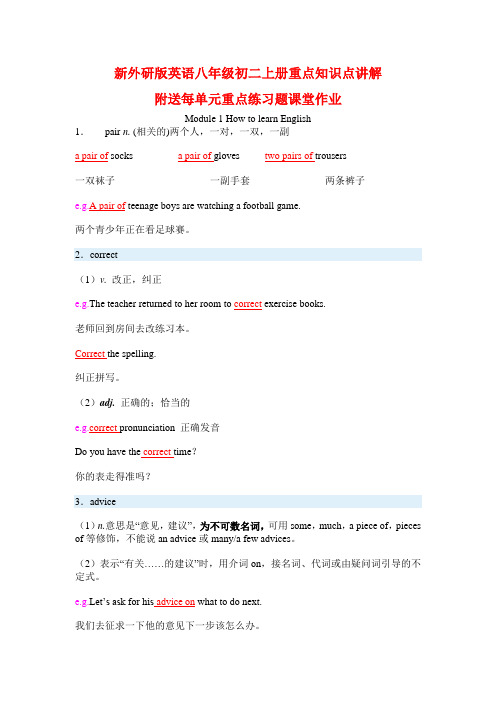
新外研版英语八年级初二上册重点知识点讲解附送每单元重点练习题课堂作业Module 1 How to learn English1.pair n. (相关的)两个人,一对,一双,一副a pair of socks a pair of gloves two pairs of trousers一双袜子一副手套两条裤子e.g.A pair of teenage boys are watching a football game.两个青少年正在看足球赛。
2.correct(1)v. 改正,纠正e.g.The teacher returned to her room to correct exercise books.老师回到房间去改练习本。
Correct the spelling.纠正拼写。
(2)adj.正确的;恰当的e.g.correct pronunciation 正确发音Do you have the correct time?你的表走得准吗?3.advice(1)n.意思是“意见,建议”,为不可数名词,可用some,much,a piece of,pieces of等修饰,不能说an advice或many/a few advices。
(2)表示“有关……的建议”时,用介词on,接名词、代词或由疑问词引导的不定式。
e.g.Let’s ask for his advice on what to do next.我们去征求一下他的意见下一步该怎么办。
常见搭配:take/follow one’s advice接受某人的建议ask for advice 征求意见accept/refuse one’s advice接受(拒绝)某人的建议offer advice to sb. 向某人提供建议拓展:advise vt.建议常见搭配:advise sb. to do sth.advise that sb. (should) do sth.e.g.My teacher advises me to leave now.老师建议我现在就离开。
初二英语知识点总结归纳上册人教版
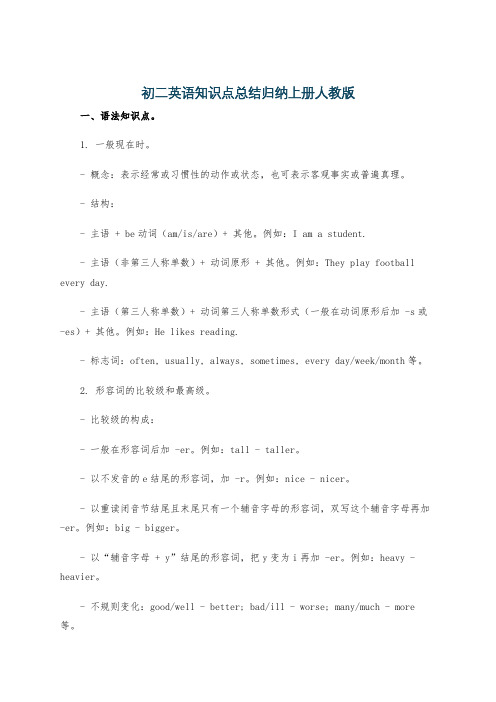
初二英语知识点总结归纳上册人教版一、语法知识点。
1. 一般现在时。
- 概念:表示经常或习惯性的动作或状态,也可表示客观事实或普遍真理。
- 结构:- 主语 + be动词(am/is/are)+ 其他。
例如:I am a student.- 主语(非第三人称单数)+ 动词原形 + 其他。
例如:They play football every day.- 主语(第三人称单数)+ 动词第三人称单数形式(一般在动词原形后加 -s或-es)+ 其他。
例如:He likes reading.- 标志词:often, usually, always, sometimes, every day/week/month等。
2. 形容词的比较级和最高级。
- 比较级的构成:- 一般在形容词后加 -er。
例如:tall - taller。
- 以不发音的e结尾的形容词,加 -r。
例如:nice - nicer。
- 以重读闭音节结尾且末尾只有一个辅音字母的形容词,双写这个辅音字母再加-er。
例如:big - bigger。
- 以“辅音字母 + y”结尾的形容词,把y变为i再加 -er。
例如:heavy - heavier。
- 不规则变化:good/well - better; bad/ill - worse; many/much - more 等。
- 比较级的用法:- 表示两者之间的比较,常用结构“比较级+than”。
例如:He is taller than me.- 最高级的构成:- 一般在形容词后加 -est。
例如:tall - tallest。
- 以不发音的e结尾的形容词,加 -st。
例如:nice - nicest。
- 以重读闭音节结尾且末尾只有一个辅音字母的形容词,双写这个辅音字母再加-est。
例如:big - biggest。
- 以“辅音字母 + y”结尾的形容词,把y变为i再加 -est。
例如:heavy - heaviest。
(完整版)仁爱版八年级上册英语知识点汇总(完整版)

八年级上学期英语知识点八年级英语短语总汇Unit1 Topic11.be going to do 打算做某事2.See sb do sth看见某人做某事(全过程)See sb doing sth看见某人正在做某事(正在进行)3.cheer sb on为...加油4.Play against=fight against 与...对抗/大战5.Be against--Be for 反对—赞同6.practice+doing 练习做...7.Prefer+doing 跟喜欢...Prefer doing to doing 或比起做后者,更喜欢做前者Perfer to do, quite a lot/bit/often.Which one do you prefer, which kind of that?10. Join+某人/组织Join in+活动/比赛加入Take part in+活动/比赛Be in+活动/比赛13.Know about... 知道/了解有关于...当时间来临时,我们将采取行动;这是我们的计划。
15. It takes sb+时间/钱 to do sthSpend+时间/钱+(in) doing sth 在某方面花费多少Spend+时间/钱+on+n.物+cost+时间/钱16.There be going to be=there will be 这里将会有...17.Be good at+(doing)sth=Do well in+(doing)sth 擅长做...18.Be sure that+宾语从句确信... 19.Be sure to do 肯定要做...20.Be sure of/about 对...有把握 21.At the weekend 在周末22.Make sb/sth+adj 使...处在什么状态23.Keep+adj 保持...;keep sb/sth+adj 使...保持什么状态24.A way to 一种...的方法 25.Relax oneself 使某人自己放松26.Play for 为...效力27.Arrive in=get to=reach+大地方;Arrive at+小地方28.Excited(人);exciting(物)29.Leave for动身做某地;leave A for B 离开A地去B地Unit1 Topic21.Could you(not)....=cuold/would you please(not)do=would/do youmind(not)doing=Would you mind (not)+if+从句2.fall ill=be ill 生病其中之一是n的复数形式.优化后的文本可以是:Use 'keep doing' for continuous action and 'keep on doing' for repeated action with intervals.5.Help sb.=give sb a hand 帮助某人6.V.+间宾(人)+直宾(物)=V.+直宾+to/for+间宾7.Sure=certainly=of course 当然8.Not at all=certainly not=of course not 不介意9.Never mind=it’s nothing=it’s doesn’t matter 没关系乱扔11.Adj.修饰不定代词放其后12.Be sorry for/about.... 对...感到内疚13.What do you mean by...?=what does...mean?=what’s the meaning of...?意思是什么?14.Shout at sb. 斥责某人15.Do/try one’s best to do sth 尽某人做大的努力做某事16.Be angry with sb. For doing sth 因为某人做某事而生气17.be angry at/about sth 因某事而生气18.be angry with 因...而生气19.With the help of sb.=with one’help 在某人的帮助下20.Say...to sb. 对某人说...e into being=be born 形成/产生22.So...that... 如此...以致...=to...too... 太...而不能...23.A century=one hundred year 一个世纪24.Over=more than 超过25.Through(中间)=aross(表面) 通过阻止他们从做28.It’s + adj +(for sb.)+to do (对某人来说)做...是...29.Another+基数词又一,在一; other +n.复数另外的Around=all_over 处到处31.Just for...只是为了...32.Turn...into... 使...变成...33.Sit around 围坐在34.Get from doing 得到...35.Such as 后不可列出前面所提过的所有东西36.A number of+n.可数复数许多的;the number of+n.单数 ...的数量37.Hero 复数(Pl.) heroesUnit1 Topic31.连字符后不加soman则例外,需用复数。
八年级英语上册1-3单元知识点同步辅导
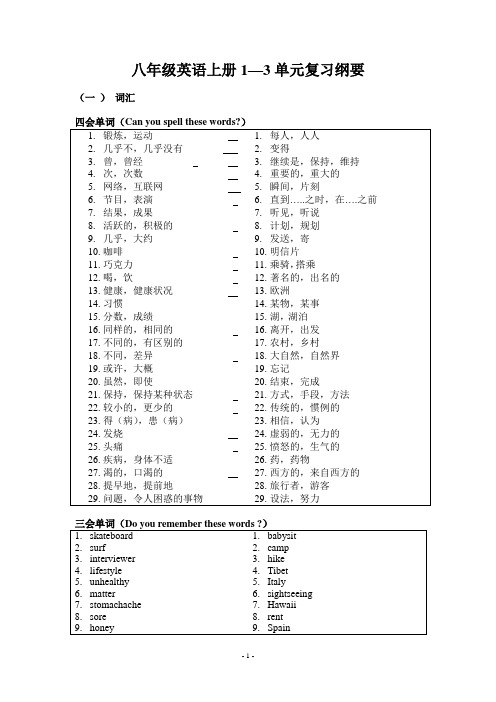
八年级英语上册1—3单元复习纲要(一)词汇1.how often多久一次2.hardly ever 几乎不3.as for 至于,关于4.go to the movies 去看电影5.every day 每天6.twice a month一月两次_7.surf the Internet 上网8.the result of…的结果9.read English books 读英语书10.junk food 垃圾食物11.how many 多少12.of course 当然13.look after 照顾,照看14.want sb. to do sth. 想要某人做某事15.be good for 对……有益16.try to do sth. 尽力做某事17.a lot of 大量,许多18.keep in good health 保持健康19.watch TV 看电视20.have a slight /little / bad / heavy cold 感冒,受凉21.(be/get ) stressed out 有压力的,紧张的22.at the moment 此时,现在23.how long 多久,多长时间24.get back 回来25.take a vacation /take vacations去度假26.a lot 很,非常27.the same as….与…相同28.be different from….与….不同29.have a sore back 背疼30.have a stomachache 胃疼31.lie down and rest 躺下休息32.see a dentist / go to the dentist‟s看牙医33.drink lots of / some water 多喝水/喝一些水34.feel well感觉好35.go to bed early36.listen to music 听音乐37.traditional Chinese doctor 传统中医38.too much 太多39.get tired 感到疲倦40.stay healthy 保持健康41.host family 房东42.take with sb.某人随身携带43.this time 这次44.go camping/ hiking/sightseeing/fishing/shopping45.go away 离开46.go bike riding 骑自行车观光47.take walks 去散步48.give advice49.mimes an illness50. rent videos to sb. 租碟片给某人rent videos from sb. 从某人那租碟片51. make a movie 拍电影52. ask sb about sth 问某人某事53. at night =in the evening 在晚上54..What/How about+ doing …怎么样呢? 1(三)重点句型1. As for homework, most students do homework every day.2. The results for “ watch TV ” are interesting.3. But my mother wants me to drink it.4. It‟s good for my health5. How many hours do you sleep every day?6. And my healthy lifestyle helps me get good grads.7. Good food and exercise help me to study better.8. Is her lifestyle the same as yours or different? What are differences?9. I think I‟ m kind of unhealthy .I hardly ever exercise.10. He shouldn‟t eat any thing11. We need a balance of yin and yang to be healthy .12. It‟s easy to have a healthy lifestyle, and it‟s important to eat a balanced diet .13. It‟s easy for sb. to do sth做某事是容易的。
- 1、下载文档前请自行甄别文档内容的完整性,平台不提供额外的编辑、内容补充、找答案等附加服务。
- 2、"仅部分预览"的文档,不可在线预览部分如存在完整性等问题,可反馈申请退款(可完整预览的文档不适用该条件!)。
- 3、如文档侵犯您的权益,请联系客服反馈,我们会尽快为您处理(人工客服工作时间:9:00-18:30)。
八年级英语上册1 3单元复习纲要(一)词汇四会单词(Can you spell these words?)1.锻炼,运动____________2.几乎不,几乎没有____________3.曾,曾经____________4.次,次数____________5.网络,互联网____________6.节目,表演____________7.结果,成果____________8.活跃的,积极的____________9.几乎,大约____________10.咖啡____________11.巧克力____________12.喝,饮____________13.健康,健康状况____________14.习惯____________15.分数,成绩____________16.同样的,相同的____________17.不同的,有区别的____________18.不同,差异____________19.或许,大概____________20.虽然,即使____________21.保持,保持某种状态____________22.较小的,更少的____________23.得(病),患(病)____________24.发烧____________25.头痛____________26.疾病,身体不适____________27.渴的,口渴的____________28.提早地,提前地____________29.问题,令人困惑的事物____________ 1.每人,人人____________2.变得____________3.继续是,保持,维持____________4.重要的,重大的____________5.瞬间,片刻____________6.直到…..之时,在….之前____________7.听见,听说____________8.计划,规划____________9.发送,寄____________10.明信片____________11.乘骑,搭乘____________12.著名的,出名的____________13.欧洲____________14.某物,某事____________15.湖,湖泊_ __________16.离开,出发____________17.农村,乡村____________18.大自然,自然界____________19.忘记____________20.结束,完成____________21.方式,手段,方法____________22.传统的,惯例的____________23.相信,认为____________24.虚弱的,无力的____________25.愤怒的,生气的____________26.药,药物____________27.西方的,来自西方的____________28.旅行者,游客____________29.设法,努力____________三会单词(Do you remember these words ?)1.skateboard ____________2.surf ____________3.interviewer ____________4.lifestyle ____________5.unhealthy ____________6.matter ____________7.stomachache ____________8.sore ____________9.honey ____________10.dentist ____________11.balance ____________12.herb ____________13.balanced ____________14.diet ____________ 1.babysit ____________2.camp ____________3.hike ____________4.Tibet ____________5.Italy ____________6.sightseeing ____________7.Hawaii ____________8.rent ____________9.Spain ____________10.Greece ____________11.Thailand ____________12.throat ____________13.advice ____________14.San Francisco ____________(二)短语1.how often多久一次2.hardly ever 几乎不3.as for 至于,关于4.go to the movies 去看电影5.every day 每天6.twice a month一月两次_7.surf the Internet 上网8.the result of………的结果9.read English books 读英语书10.junk food 垃圾食物11.how many 多少12.of course 当然13.look after 照顾,照看14.want sb. to do sth. 想要某人做某事15.be good for 对……有益16.try to do sth. 尽力做某事17.a lot of 大量,许多18.keep in good health 保持健康19.watch TV 看电视20.have a slight /little / bad / heavy cold 感冒,受凉21.(be/get ) stressed out 有压力的,紧张的22.at the moment 此时,现在23.how long 多久,多长时间24.get back 回来25.take a vacation /take vacations去度假26.a lot 很,非常27.the same as….与。
相同28.be different from….与….不同29.have a sore back 背疼30.have a stomachache 胃疼31.lie down and rest 躺下休息32.see a dentist / go to the dentist‟s看牙医33.drink lots of / some water 多喝水/喝一些水34.feel well感觉好35.go to bed early36.listen to music 听音乐37.traditional Chinese doctor 传统中医38.too much 太多39.get tired 感到疲倦40.stay healthy 保持健康41.host family 房东42.take with sb.某人随身携带43.this time 这次44.go camping/ hiking/sightseeing/fishing/shoping45.go away 离开46.go bike riding 骑自行车观光47.take walks 去散步48.give advice49.mimes an illness50. rent videos to sb. 租碟片给某人rent videos from sb. 从某人那租碟片51. make a movie 拍电影52. ask sb about sth 问某人某事53. at night =in the evening 在晚上54..What/How about+ doing> …怎么样呢? 1(三)重点句型1.As for homework, most stuents do homework every day.2.The results for “ watch TV ”are interesting.3.But my mother wants me to drink it.4.It‟s good for my health5.How many hours do you sleep every day?6.And my healthy lifestyle helps me get good grads.7.Good food and exercise help me to study better.8.Is her lifestyle the same as yours or different? What are differences?9.I think I‟ m kind of unhealthy .I hardly ever exercise.10.He should‟t eat anying11.WEeneed a balance of yin and yang to be healthy .12.It‟s easy to have a healthy lifestyle, and it‟s important to eat a balanced diet .13.. It’s easy for sb. to do sth做某事是容易的。
It‟s important for sb. to do sth .做某事很重要14.Everybody gets tired sometimes.15.I‟m tired and I have a lot of headaches.16.She is babysitting her sister.17.W hen are you going ? I …m going on Monday.18.I‟m going hiking in the mountains.19.I don‟t like going away for too long.20.Show me your photos when we get back to school.21.How long are you staying? Just for four days.22.What‟s it like there ?23.How‟s the weather there?24.He thought about going to Greece or Spain, but decided on Canada.25.This time I want to do something different.26.I know there are many people there who speak French.27.He is leaving the first week in June and staying until September.28.I‟m planning to spend time in the beautiful countryside.29.I can forget all my problems.30.I just finished making my last movies.31.I want an exciting vacation.32.She‟s leaving for Hong Kong on Tuesday.33.I hear Thailand is a good place to go sightseeing.●考点知识梳理1. He sometimes watches TV. Sometimes= at times 有时候;some times好几次;sometime 在某时,有朝一日;some time 一段时间;He has been to Beijing some times.I‟ll come to see you sometime next week.I waited for you some time.2. Most students exercise three or four times a week.Most of students in our school are League members.Most of the apple has been eaten by rats.Exercise 的用法:○1v. 锻炼,运动You are getting fat ,You should exercise more. ○2n. 不可数名词Take more exercise to keep healthy. 可数名词,意思为; 练习,习题We do many math exercises every day. ○3do moning exercises 做早操3.My mother wants me to drink it.She says it‟s good for my health .Want sb. to do sth. stay healthy 保持健康=keep healthy=keep in good healthbe good for sth./ doing sth. 对什么有益,对什么有好处be bad for sth./ doing sth. 对什么有害●.be good for 对......有益Doing morning exercises is good for your health.做早操对你们的建康有益。
